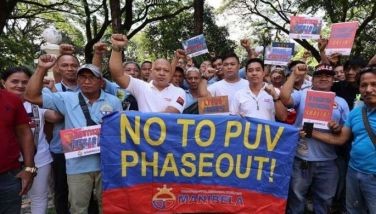DENR pushes for JPEPA, assures no toxic dumping
The Department of Environment and Natural Resources (DENR) yesterday pushed for the ratification of the controversial Japan-Philippines Economic Partnership Agreement (JPEPA) since the treaty would not open the country to toxic wastes from
In a briefing with reporters a day after attending the third hearing on the JPEPA at the Senate Thursday, DENR Undersecretary for Operations Demetrio Ignacio defended provisions in the JPEPA regarding the supposed entry of toxic wastes into the country which is opposed by various environmental groups.
Ignacio stressed that importation of toxic wastes from
He said the JPEPA assures that Philippine laws shall always prevail in the implementation of the pact.
“There is nothing in the JPEPA that would allow the entry into the country of toxic waste from
“On the contrary, the treaty contains several provisions that recognize the primacy of Philippine laws, particularly Republic Act 6969, in matters pertaining to the entry of toxic or hazardous wastes into the country,” he also said.
R.A. 6969, otherwise known as Toxic Substances and Hazardous and Nuclear Wastes Control Act of 1990, prohibits the importation of toxic wastes into the country. The Basel Ban Amendment, to which the Philippine government is a signatory, similarly imposes such ban.
“Besides, we do not expect upsurge of hazardous wastes (in the country due to the JPEPA) because (importation of) toxic wastes is not allowed here. If ever there would be toxic wastes, those are contained in recyclable materials, which entry is allowed under existing laws,” Ignacio pointed out.
DENR officials said the JPEPA covers 5,975 specific commodities or tariff lines, of which a total of 145 products or 2.42 percent are in the environment sector.
Specifically, Ignacio said JPEPA covers 30 hazardous product/wastes categorized as “prohibited” (such as municipal ash and residues, sewage sludge, residual products of chemicals, ozone depleting substances already phased out, etc.); and “regulated” (such as arsenic, sulfuric acid, waste and scrap of cast iron, stainless steel, mercury, cyanide, etc.).
Ignacio said these hazardous wastes were included in the JPEPA since the treaty used the “harmonized system”, as basis for its classification of goods in trade.
The harmonized system (HS) is defined as an international and uniform classification of all goods traded in the world, adopted by all countries.
“The HS and its commodity description and coding system was adopted in the JPEPA negotiations. This inevitably included hazardous waste products,” Ignacio said.
Ignacio then enumerated the allowable types of recyclable materials that can be imported in the
Ignacio firmly claimed that importation of recyclable materials from
At this point, Ignacio said that while
In fact, he added, the
“The
He said that in 2005 and 2006, we exported 22.1 million kilograms of contaminated soil, sludge, used oil, and other hazardous wastes to the
- Latest
- Trending




























